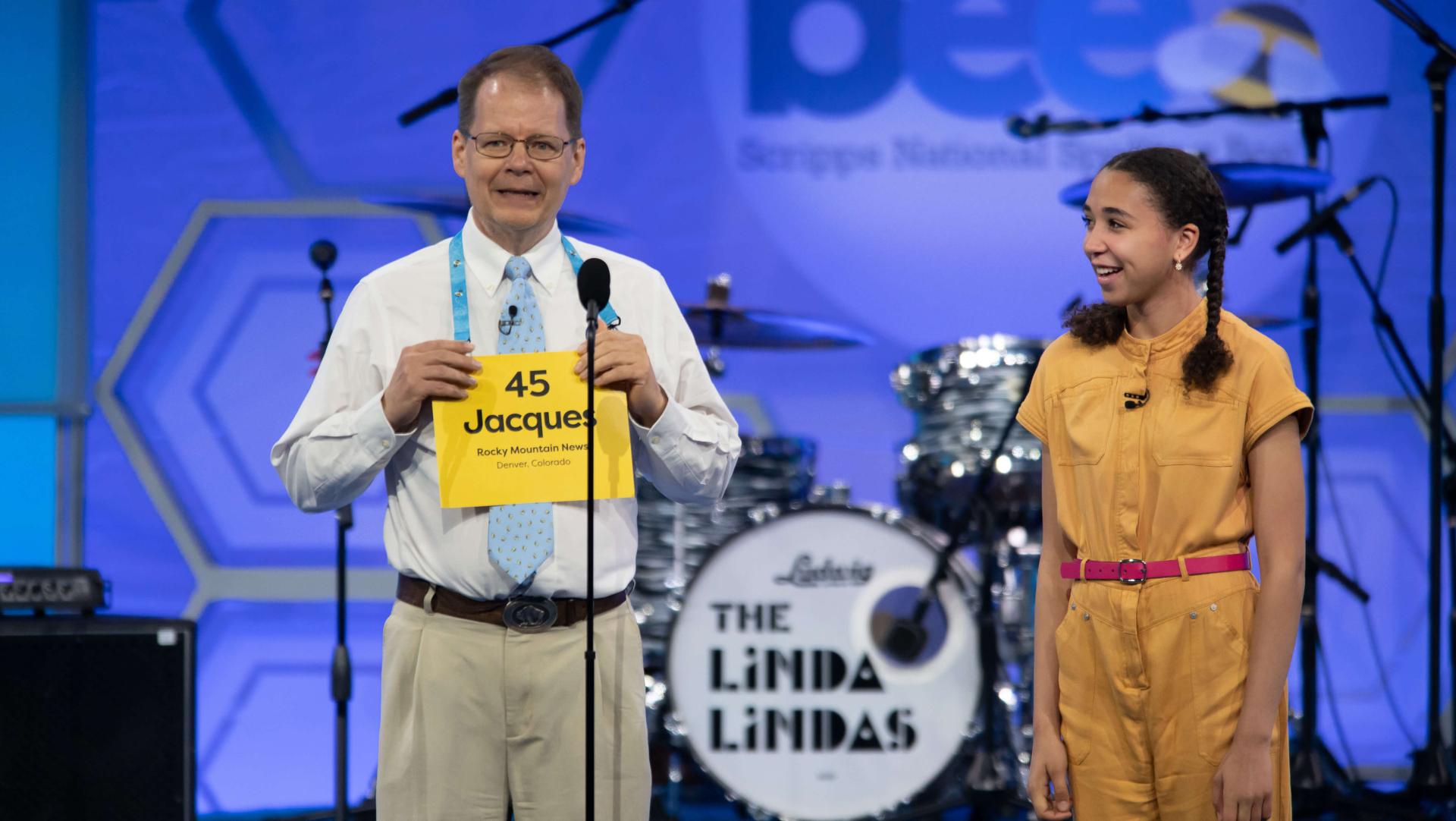Before participants in the Scripps National Spelling Bee (a.k.a. the Bee) can spell a word, someone must pronounce it for them. For the past 21 years, that someone has been Jacques Bailly, Ph.D., associate professor in the Classics Program and graduate coordinator for the M.A. in Greek and Latin in the Classics Program in the College of Arts and Science's School of World Languages and Cultures at UVM. As the official pronouncer for the Bee, Bailly pronounces all the words while trying “to essentially be an anchor for the contest, keeping it on a steady pace, keeping the mood upbeat, encouraging the kids, and helping them if I can.”
Begun in 1925, the Scripps National Spelling Bee is a week-long annual event that begins on Memorial Day weekend in National Harbor, Maryland. The participants are winners of regional spelling bees. Most are from the United States, but students from other countries do sometimes compete. They range in age from nine to 14, grades three through eight.
Bailly’s own history with spelling bees goes back to 1977 when his sixth-grade teacher asked him if he wanted to be on the spelling team. “After school a few times a week, we would go through lists of difficult words, and I memorized them,” he says. Three years later, he won a local bee and then a two-state bee for Colorado and Wyoming. In 1980, he was named champion of the Scripps National Spelling Bee, the very contest for which he would later become the pronouncer.
Over the next 10 years, Bailly stayed involved in local spelling bees, mostly in Colorado. In 1990, he wrote to the National Bee, offering to volunteer. “I got lucky,” he says, “because the man who had been the associate pronouncer and had also been in charge of the word list was leaving.” Bailly moved into that slot and did it for about 10 years. In 2003, Alex Cameron, who had been the pronouncer for the Bee for many years, passed away. Bailly was offered the position and has been the pronouncer ever since.
“There are a lot of moving pieces,” Bailly says of the Bee. “I work with a huge team and they’re all just wonderful and amazing.” The team includes word contributors, copy editors, people who work on the vocabulary questions, and people who come up with the list of increasingly difficult words that will be used in the competition, among others. “We’re all word nerds and just love different aspects of the words,” Bailly says.
During the Bee, Bailly essentially reads from a script that he and the word contributors have worked all year to create. The script is a list of words with all the pronunciations they’re going to use, the definitions of the words, and their parts of speech. “We try to use the words in two kinds of sentences,” Bailly says. One is a straight sentence with an interesting use of the word, and the other is often a bit more comedic or even a little unusual. For example, for the word gnocchi (a type of pasta), “the everyday sentence was about someone ordering it as a menu item at a restaurant.” The more lighthearted sentence “was about two children having a food fight, with gnocchi winding up in their hair.” Bailly substituted his own children’s names in that sentence, to their lasting delight.
One moment from the Bee that sticks out in Bailly’s mind is when a participant named Kennyi Aouad got the word sardoodledom, which refers to melodramatic playwriting, based on a criticism of French playwright Victorien Sardou. “Kennyi got this word and he just cracked up because he thought it was the funniest thing to pronounce,” Bailly says. “He just loved the sound of the word, obviously. And then he spelled it correctly.”
Bailly says his favorite moments come when the speller gets a word and is obviously puzzled or unsure. “Then they ask a few questions, the information sort of clicks in their brain, and they spell it,” he says. “That shows that there is a real skill there that’s different from memorization.”
Bailly likes to watch the other kids when this happens, as they realize there’s something important and interesting to learn in the origins and meanings of the words.
Although Bailly doesn’t have a favorite word to spell, he does have several standouts. “I like bookkeeping because it’s B - double O - double K - double E - P-I-N-G. There aren’t too many words that have three double letters in a row,” he says. He also likes the name of the state fish of Hawaii, the Humuhumunukunukuapua’a, “just because you’ve got to teach yourself to say it, unless you’re from Hawaii, and it’s got a lot of repetition in it.”
Bailly is also fond of words with interesting or funny etymologies. “I kind of collect those,” he says. “For example, if you look up the word sturdy, eventually you'll get to a story about these birds that were eating too many berries and got drunk. And feisty is a good one, too.” Feisty apparently originated from a word that referred to a flatulent dog. He also likes those words that enter the English language and stick but refuse to “go English,” such as savoir faire.
Bailly will be pronouncing all the words, answering as many questions as he can, and keeping things moving along at a steady pace once again at this year’s Scripps National Spelling Bee, which takes place May 26–31, 2024. The semifinals and finals can be seen on the Ion TV channel.
